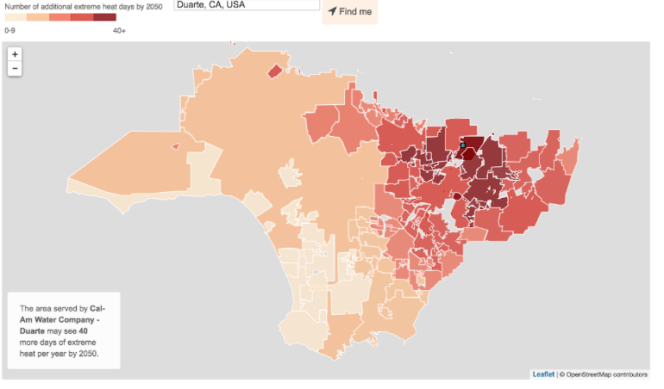After decades on the books, community voices -- supported by NRDC and countless others -- prevailed and the 710 North “gap closure” project is dead. Good riddance. But the plan on how to spend the $400 million in leftover money is an affront to the health of San Gabriel Valley residents and our climate future.
By 2050, UCLA climate scientists expect the San Gabriel Valley to see the number of extreme heat days with 95-plus degree temperatures climb from 32 today, to 74 by 2050, and 117 by 2100. Imagine: four months of every year with 95+ temp days. That’s a future kids born this year will live through unless we take immediate steps to halt climate change.
But we don’t need to wait until mid-century to know climate change is impacting communities across Los Angeles. Climate change is making our local wildfires hotter and more destructive, according to UCLA researchers.
With so much at stake -- lives shortened, habitat lost, communities irrevocably harmed -- community leaders in a position to mitigate the worst effects of climate change must act. It’s a moral duty they must not shirk.
This Thursday, the 13 elected and appointed officials who make up the Los Angeles County Metropolitan Transportation Authority board of directors have a once-in-a-generation opportunity to invest $400 million in the San Gabriel Valley that could help reduce the leading source of carbon emissions in California -- the tailpipes of passenger vehicles and trucks.
Two weeks ago, 13 federal agencies including the EPA and NASA told us we have vanishingly little time to act on climate change.
Last week, our California climate regulator, the Air Resources Board (ARB), excoriated cities and regions for failing to meet their greenhouse gas reduction goals due to spending funding on roads rather than sustainable transportation.
This week, will Metro take this opportunity to invest in $400 million worth of electric buses, walkable sidewalks, bike connections and mobility improvements for families, seniors, and workers?
Sadly, exactly the opposite. The Metro Directors are on a glide path to pouring more gasoline on our local climate change fire with $400 million in projects to entice more driving and undermine transit ridership on Metro’s own buses and trains.
When Metro and Caltrans finally agreed not to move forward with the deeply misguided 710 North project, Metro should have made the obvious pivot to a climate-smart transportation approach that improves mobility options and reduces pollution.
Instead, Metro is set to approve a $400 million grab-bag of road widenings -- including a six-lane surface highway on Atlantic Avenue -- that amount to a freeway death by a thousand cuts for the communities of Alhambra, Pasadena, San Gabriel, Monterrey Park, Montebello, and more.
The road package was developed behind closed doors with limited public input from the communities previously in the path of the 710 North project. Despite SGV cities asking for money for bus-rapid transit corridors, Gold Line connections, and zero emission buses, Metro is considering a cherry-picked list of road projects that will encourage more driving and fill our communities with congestion and air pollution.
It’s time for Metro to pump the brakes on this misguided, climate-harming road plan.
It’s time for Metro to follow through on its own adopted complete streets and equity policies.
It’s time for our elected leaders to match their lofty climate words with real action that makes a difference.
It’s time for Metro Directors to send this back to the drawing board, generate a true public process centered in the values of community health, equity and sustainability, and produce a list of projects that reduce vehicle emissions, improve mobility for those who need it most, and ensure the residents of the San Gabriel Valley can finally breathe clean air.
Natural Resources Defense Council's Carter Rubin advocates for creating transportation options that reduce carbon emissions and support equitable access for all. Rubin previously served for five years in the Los Angeles mayor’s office working on transportation policy and performance management. He earned his master's in urban and regional planning at the University of California, Los Angeles, where he focused his studies on transportation, land use, and parking. Rubin serves as a board member of California Streets Initiative, the umbrella non-profit that runs Streetsblog's L.A., S.F. and California websites.






